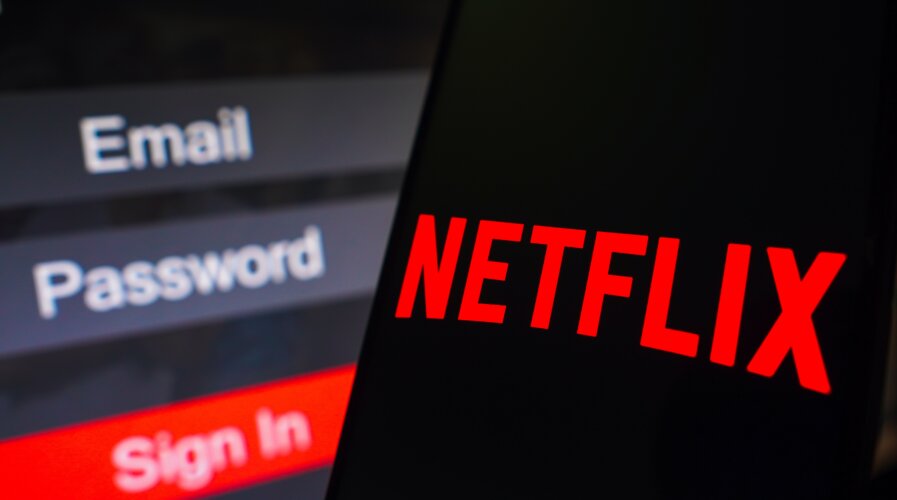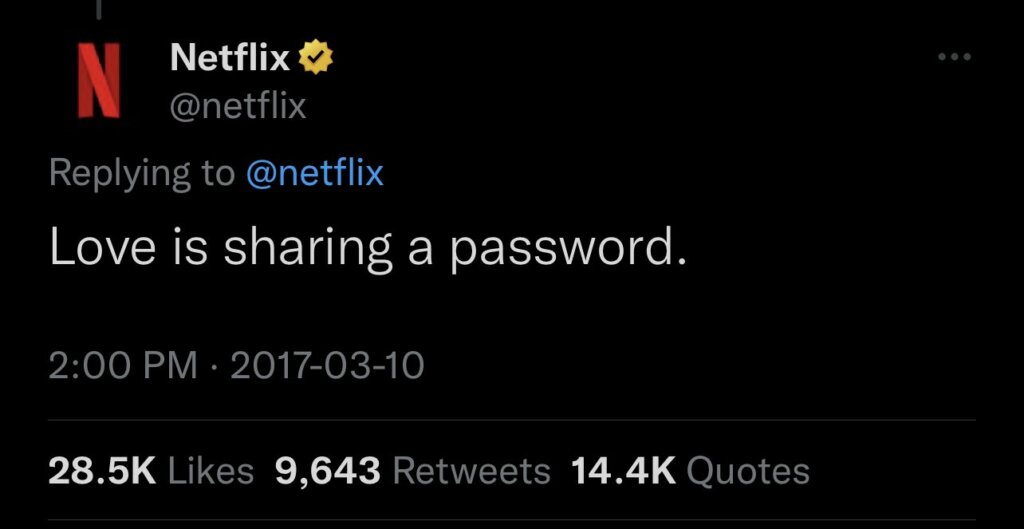
Netflix, Disney, and Adobe: The changing landscape of password sharing. (Source – Shutterstock)
From “Netflix and chill” to “Netflix and bill” – Is password sharing a thing of the past?
- Password sharing on platforms like Netflix, Disney, and Adobe is undergoing a seismic shift.
- Industry insiders believe that sharing is the future, but not without risks, including scams and cybersecurity concerns.
- Password sharing sites need to address those security risks.
Well, that tweet didn’t age well.
Following the streaming giant’s crackdown on password sharing across the globe, users are feeling the pinch of restricted access, fueling a sense of determination to seek affordable alternatives.

Say what?
However, this heightened resolve has led to another concerning trend: the increase in scams related to password sharing. This exposes users to the potential risks of online scams and fraud – which happens to involve Netflix in one case. In the scam, victims first receive e-mails, allegedly from trusted sources such as Netflix, containing a link to renew subscriptions.
Upon clicking on the links, victims are redirected to phishing websites, where fraudsters imitate legitimate sites to steal personal information. There, they are asked to provide their credit or debit card details and one-time passwords (OTP).
Victims realize they have been scammed only when they discover unauthorized transactions have been made using their credit or debit cards. The Straits Times reported that the total losses from the scams have added up to at least SG$ 12,500.
So far.
The response: Corporate take on password sharing
Some have turned to platforms like Carousell, where they can connect with strangers to share subscription costs, alleviating the burden while enjoying their favorite content.
It doesn’t help that companies like Disney and Adobe are following Netflix’s lead. For Disney, CEO Bob Iger said that the Mouse will also be enforcing a password crackdown at the beginning of 2024.
Iger emphasized that the company is actively exploring ways to address account sharing and the best options for paying subscribers to share their accounts with friends and family.
He also mentioned that later this year, the company will begin to update its subscriber agreements with additional terms on its sharing policies, and Disney will roll out plans to drive monetization sometime in 2024. The company will unveil new password sharing policies later this year and implement them in the next year.
However, Adobe’s approach is a little different – it relies on collecting a lot of your data. The provider’s new software, “Prime Account IQ System,” uses sophisticated machine learning models to collect user information and detect behavior patterns on their accounts. This information includes how many devices are on an account and the geographical locations of the users.
After compiling this user data alongside common usage patterns, the system produces a “sharing probability” score, determining the credential sharing probability. The software also estimates whether these users are likely to be travelers, commuters, close friends and family, or owners of multiple homes.
If Adobe’s Prime Account IQ System decides you’re guilty of password sharing, it will hit you with an “Excessive Sharing” warning. Information regarding these ‘problematic’ accounts is then passed over to the company, and if users decide to ignore the caution, they risk being blocked from the platform.
As companies like Disney and Adobe adapt to the reality of password sharing, we must ponder what this means for the future of subscription-based models. To explore this further, Tech Wire Asia turned to an industry insider for a deeper dive into what the future may hold.
Inside scoop on the future of password sharing
We had the opportunity to speak with Chris Ye, Founder of ShareIt.SG, on the pushback from major companies against password sharing, and what he envisions the future of subscription sharing will be. According to Ye, there might be some misconceptions surrounding the sharing policies of major companies.

Chris Ye, Founder of ShareIt.SG
“Take the recent case of Netflix’s password crackdown for instance. While it might seem counterintuitive, it’s actually quite the opposite,” said Ye. “Netflix has introduced new options that allow users to share their subscriptions more easily. This feature, which is called “extra members,” enables you to add additional members of your choice to your subscription plan. So, the notion that major companies are against sharing might not hold true in all cases. Family plans, and sharing with other members will be the future of subscription sharing.”
As companies modify sharing policies, understanding the fine print becomes increasingly critical for consumers. The prospect of password sharing evolving into a legal issue adds a layer of complexity. Companies must weigh the benefits of these measures against the potential for alienating their customer base.
He shed light on how this corporate posture on sharing might be changing. “Subscription-based businesses might start to offer group-based or tiered subscription plans, acknowledging the trend instead of fighting it. They might also look into partnerships with sharing platforms to manage and monitor these shared accounts securely, thus reducing the risk of password sharing to piracy,” said Ye.
Ye also pointed out that the shared digital economy will likely expand beyond just streaming platforms. “I see this trend expanding into other digital services, from cloud storage to software licenses. Essentially, any service that can be shared without diluting its value could be a candidate. This could pave the way for a more collective and cost-effective approach to digital consumption,” he added.
While companies are adapting to the realities of password sharing, this trend comes with its own challenges, especially when it comes to safeguarding user data. Let’s dive into some of these cybersecurity concerns.
Cybersecurity concerns: safeguarding user data in the age of sharing
The new world of subscription sharing isn’t without its pitfalls. The increasing trend towards shared subscriptions raises a fundamental question: how can platforms protect user data from security threats like phishing?
“At ShareIt.SG, we’ve put in place a variety of authentication layers to ensure users are verified before they can access the platform’s services. Notably, mobile phone verification plays a crucial role among these security measures. When it comes to platform transactions, we collaborate closely with Stripe, a leading worldwide payment provider, entrusted with overseeing all payment-related details,” Ye explained.
So what are some of the common challenges platforms like ShareIt.SG might face in ensuring user security?
“User verification and data encryption are big challenges. We address these by using advanced algorithms to verify the identity of users and implementing end-to-end encryption to protect users’ data. We also constantly update our security protocols to adapt to new types of threats. This is an ongoing process that requires us to stay vigilant and continually adapt our approach,” said Ye.

ShareIt.SG currently has over 15,000 users on its platform sharing various services including Netflix, Disney+, Canva, Spotify, and more. (Source – ShareIt.SG)
In addressing these concerns, ShareIt.SG adopts a proactive approach. “ShareIt.SG places a heavy emphasis on security, user verification, and data protection. We continually adapt to the market’s needs, adjusting our platform’s features to ensure optimal user experience and security. We’ve also been proactive in reaching out to original service providers, seeking partnerships to make the process even more seamless and secure,” Ye explained.
Now that we’ve delved into how businesses are adapting their models, let’s shift our focus to a regional perspective to understand the broader implications for markets like the Asia-Pacific (APAC) region.
Password sharing in the APAC region
What does this mean for a region like APAC, which is fertile ground for digital innovation? With diverse markets having varied needs, Ye believes the region offers enormous growth potential. Emerging economies in Southeast Asia, in particular, present a big opportunity, given the rising digital penetration and a young, tech-savvy population.
In markets where digital subscriptions can be prohibitively expensive, password sharing morphs from a cost-saving measure into a necessity. This raises questions about whether a one-size-fits-all policy is appropriate, especially in diverse socioeconomic contexts. There is a risk that such an approach could exacerbate the digital divide.
Individuals who become part of a family group can now take advantage of services they might not have considered paying the full price for. Without this option, they might be more inclined to resort to piracy.
In markets where subscriptions are expensive, password sharing becomes more than just a cost-saving measure; it’s a necessity—platforms like ShareIt.SG presents a fresh approach to accessing services at a reduced cost, effectively deterring users from resorting to piracy. This is particularly significant given the proliferation of numerous streaming platforms, which can lead to rapid cost accumulation. The ability to share these services among family members not only enhances the overall experience but also promotes cost savings.

ShareIt.SG approach on subscription sharing. (Source ShareIt.SG)
Starting any platform in the digital sharing economy poses challenges. And it might be a nerve-wracking experience for newcomers who could face significant entry barriers.
“From my own experience, I’d say the initial uphill challenge is keeping the business afloat amid a volatile market,” said Ye. “I invested a significant amount of time and energy to get ShareIt.SG off the ground and maintain its relevance in the market.”
Having discussed the potential for growth and the challenges in the APAC region, it’s crucial to follow up with the individual user. After all, the rise of sharing platforms brings a host of cybersecurity risks.
For individuals, the ability to share subscriptions offers cost savings – but also exposes them to risks. The rise in scams is alarming, adding layers of deceit to what many see as a modern convenience. The situation calls for a substantial ramp-up in security measures by the platforms involved.
READ MORE
- Safer Automation: How Sophic and Firmus Succeeded in Malaysia with MDEC’s Support
- Privilege granted, not gained: Intelligent authorization for enhanced infrastructure productivity
- Low-Code produces the Proof-of-Possibilities
- New Wearables Enable Staff to Work Faster and Safer
- Experts weigh in on Oracle’s departure from adland






